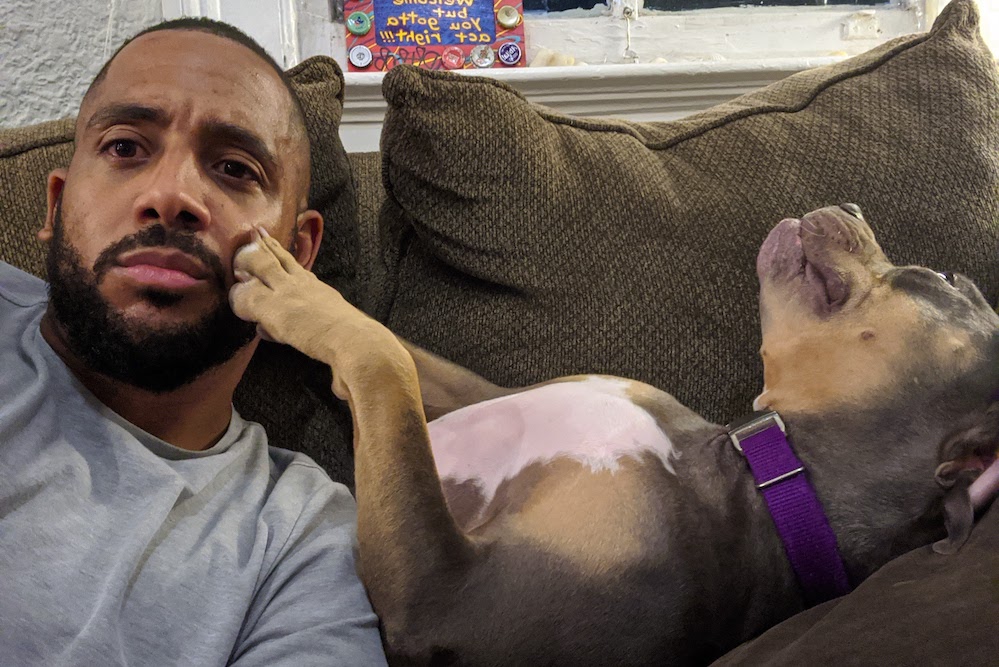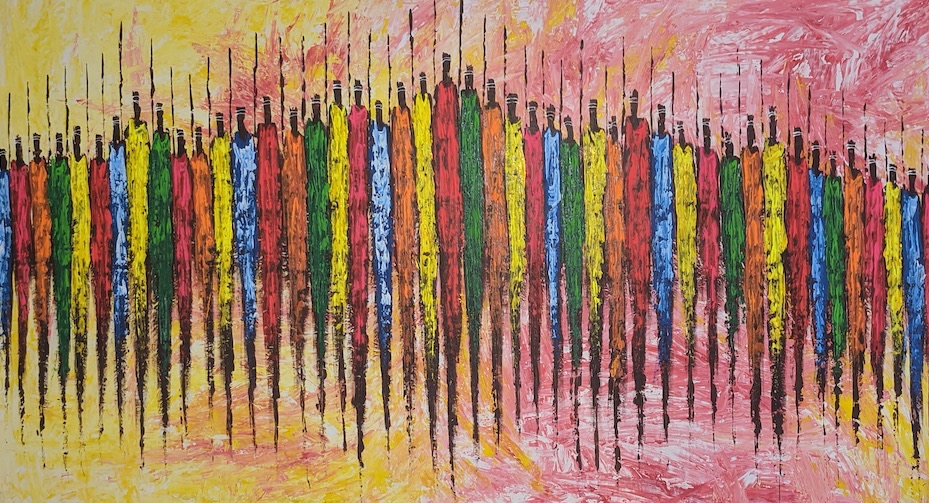
Courtesy of Jamiles Lartey and his dog, Kora.
Jamiles Lartey is a staff writer at the Marshall Project covering the criminal legal system in the United States South. He previously wrote about criminal justice, race, and policing as a reporter for the Guardian. Before moderating a Zócalo/University of Toronto panel discussion titled “What Would Society Look Like Without Police?,” he spoke in our virtual green room about spoiling his dog rotten, the joy of brown butter chocolate chip cookies before bed, and the importance of exercising “intellectual empathy.”
What did you have for breakfast this morning?
Did I have breakfast this morning? God, it’s still, you know, the post-Thanksgiving thing. So I definitely had one of those sweet Hawaiian rolls and a cup of coffee.
You come from a journalism family—your grandfather being a Ghanaian broadcast legend. Did you ever consider a different path?
Actually, I started off in the nonprofit sector. And really journalism came out of a disillusionment with the nonprofit sector and with the direct service sector. That was 2010, when the Tea Party was in power, so all of these federal grants were getting slashed left and right. I started writing a blog. It didn’t have a lot of followers, but I just found something very rewarding about expressing ideas and thoughts and having people engage with them. So that’s how I got here.
What was the first criminal justice-related story that you reported?
“The Counted,” a project by the Guardian tracking of all the people killed by police in 2015 and 2016. That was a very impactful, important piece of journalism, and I’m very privileged to have been allowed to work on it straight out of [graduate] school.
Is there a teacher or a boss who changed your life?
If you gave me five different days, I’d probably give you five different answers. But I did have a professor in college at the State University of New York at New Paltz by the name of Margaret Wade-Lewis, who was my first Black Studies professor. She actually had been my mom’s teacher—my mom went to the same college I did, so like 30 years earlier, my mom was in her class. I don’t even think I realized that when I signed up for it. I went home and was like, “Hey mom, I have this great teacher, Margaret Wade-Lewis.” My mom was like, “She’s still there? Oh my God.”
I was a fairly mediocre student in middle school, high school, and community college. I was always smart, but never particularly driven. [Margaret Wade-Lewis] ignit[ed] this love of learning and this passion for words and books and ideas in me, making me an obsessive nerd about criminal justice, history, race scholarship, the world.
If you could time travel to any year, past or future, which year would you choose?
Probably 1968.
Where would you go in 1968?
You could pretty much drop me anywhere. Maybe the Bay area. I probably shouldn’t say that because I’ve never been there in the present time. As a sort of history nerd of the latter half of the 20th century and as a music fan, someone who loves Jimi Hendrix and James Brown, [I’d like to be] at the beginning of the funk and soul. Also the clothes—come on, I could have had a mustache, and it would’ve been great.
Any other musical heroes you’d like to add to that list?
Oh, there’s so many, there’s so many. Let’s say Fela Kuti.
What’s been your quarantine guilty pleasure?
My forever guilty pleasure—as someone who does care quite a bit about health and fitness and was at one point a personal trainer—is sweets before bed. Especially cookies. Especially with milk.
A nice brown butter chocolate chip cookie with oat milk now, cause the dairy isn’t so much a great fit. That right before bed is devastating, devastatingly good.
Are there any Ghanaian practices or traditions that you’ve picked up from your father’s side of the family that you think should be more widely adopted?
One of the things that always made—and makes—Ghana feel like home to me is this kind of vivaciousness for life. It’s not always about striving and getting to the next level and having the next success. Sometimes it’s just about being with the people who you’re with and listening to music really loud and dancing and smiling and laughing and eating and drinking. That’s certainly not a specifically Ghanaian thing. All of the world’s cultures have times and places for that, and even in America, we have times and places for that. But I think that’s just one of the things that I’ve always valued.
We could also eat with our hands more. They’re really effective. They really work for food, it’s great. You wash them before you eat, you use them—you don’t need all this stuff anymore.
Your dog, Kora, has her own Instagram profile. What is the most ridiculous thing you’ve ever done for her?
I’m going to wriggle out on a technicality here because I don’t think anything that I do for her is ridiculous. I think it’s all very logical, up to and including tucking her into very cushy and elaborate blanket and pillow forts so that she’s as comfortable as possible, or bringing home large bags of bones from restaurants. I mean, it all makes sense to me.
Out of all of the things hanging on your walls, what is your favorite piece?
Probably this painting that I got in Ghana. It’s kind of an abstract picture of maybe 30 or 40 tribal warriors, all wearing different colors, all standing together. As sappy and cliché as it sounds, they’re all super unique, but they’re also all in lockstep; they’re all standing with a sense of purpose. At our best, that’s what societies are: A group of very unique, different people who are standing with a common purpose.

I got it at one of the arts markets, just walking around and it grabbed my eye. [The funny part is] I left it in the airport. It’s probably like four by six feet—it’s big, and it was rolled up. I slid it under my seat [in the terminal], and I’m just all frazzled cause I have a 10-hour flight in front of me. I sit down on the plane, I put my headphones on, and—”My painting!” I grabbed the flight attendant, I’m like, “Oh, can you please, can someone please, please go back and get it.” And someone really ran and got it and brought it back to me right before they closed the door. I was like, that never would have happened in America. I’m so lucky it happened on that side of the trip.
What advice do you have for journalists wanting to cover criminal justice, race, and policing right now?
If they’re in the local level, I would say be cautious of some of the traditions in the local crime beat because a lot of them have not served communities well.
There is a degree to which local reporters act as sort of stenographers for police, stenographers for prosecutors, for the “system.” I’m a firm believer that it is not our job as journalists to be overturning and destroying the system at every turn. I think that is the place for activists. I think the role of journalists is to neither be stenographers for activists or for the police, but to try to exercise some level of distance from both. To, as much as possible, try and be fair to all sides, entertain all sides and try to employ what I like to call “intellectual empathy.”
There’s emotional empathy, which we all understand—put yourself in someone’s shoes, imagine feeling how they feel. I also think there’s a valuable exercise in putting yourself in someone else’s brain and, given the life experiences and the nature of their interactions with the world, [trying] to understand how their perspective would make sense to them.
I am constantly thinking about the fact that no one owes me their story or their time. As journalists, ultimately what we’re asking people for is uncompensated labor. We’re asking them to put aside time in their day to give us the raw materials that let us make our stories.
How do you personally reckon with that in your reporting?
I don’t like imposing on people. I don’t like asking them for things without being able to reciprocate. My love language is acts of service. So sometimes journalism can feel really uncomfortable to me from that point of view. Whenever possible, I think I’m looking for moments to reciprocate. And I think you can reciprocate emotionally by letting people know that you’re listening and you want to amplify what they have to say. You think that their perspective is important and valuable, and you don’t take it for granted, and you don’t expect it. That every moment that someone spends with you as a journalist is like a gift that they’re giving you, and in a broader sense, that they’re giving your publication and society at large. This is how we all learn what’s going on around us—because people choose to share with journalists.



